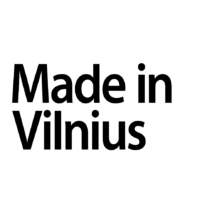The aim of the latest video clip about Vilnius, which received criticism, is to attract the attention of foreign audiences by shocking it, says Dovilė Aleksandravičienė, head of the city development agency "GoVilniaus".
"The goal of this campaign is not to present Vilnius, but to attract attention by shocking," D. Aleksandravičienė told LRT television on Friday.
On Thursday, the "GoVilnius" city development agency presented a new city business and tourism development campaign "Expectations vs. Reality" (lit. "Expectations and reality"). The video clip shows scenes with an outdoor toilet, wooden carts, fights near containers, young people urinating on the walls of the house. In the second part of the clip, these stereotypes are allegedly refuted, showing general images from today's life in Vilnius.
As indicated on the agency's website, the aim of the campaign is to increase the awareness of the city in the target tourism markets of Great Britain and Germany.
"The campaign through both markets (Germany and United Kingdom - ELTA) will cost 0,5 million in two months. euros. (…) We predict that these markets will generate about 30 million for the city this year. euros", said D. Aleksandravičiūtė.
However, some Vilnius residents do not hesitate to criticize the hyperbolized stereotypes chosen in the campaign, as well as the proportion of negative and positive images of the capital. In turn, in response to this criticism, the head of the agency emphasizes that the image of the capital, reinforced by stereotypical images of Eastern Europe, is a tool designed to shock the viewer and draw his attention.
"This is a condensed picture. Why is it needed - to shock, draw attention. Then, when those people come to the page to which this advertisement will lead, Vilnius is already there, of course, presented with all its historical, cultural, gastronomic, architectural features. The way he is," said D. Aleksandravičiūtė.
"Why did we act so boldly? It wasn't like four or five people thought and decided that way. We have endless research on which to base this decision. One of the arguments is that after we made this clip, we had a pre-test campaign in the German and British markets, showing this ad and asking how it affects you. (…) After the survey, we see that half of the people are interested in what Vilnius is and would like to find more information - this is a very good indicator. A third would consider visiting the city and having a weekend getaway. Growing tourism is one of the goals we are aiming for in the final result," said the head of GoVilnius.
Positive results are already visible
According to the agency's comment sent to Elta, although the paid advertising will start only next week, the clip has already reached foreign audiences.
"We can already see the positive results: within the first day, the video clip received more than 400 views on various social media platforms. views; and based on the current social statistics of the platforms, positive reactions make up more than 90 percent," the agency said in a comment.
It is announced that the advertising idea was created by the creative agency "BM Boutique", and the video clip was directed by Simonas Aškelavičius. The creation of the video clip cost 81 thousand. euros, it is financed from the tourist tax.
"This includes the creation of a creative idea, a video clip, illustrations, internet billboards, outdoor advertising layouts," the agency's representatives report.
According to the manager of "Go Vilnius", the advertisement will be broadcast in the digital space, on the most popular "Meta" and "Google display network" platforms, as well as in the United Kingdom, the advertisement will also be spread in metro and train stations.
As the agency itself announces, post-Soviet associations of the country's image are reflected in almost every Go Vilnius awareness and image survey, and in 2022. "Travel in Lithuania" survey also showed that all of Lithuania in the United Kingdom and Germany is associated with the concepts "Russia" (10%), "Eastern Europe" (respectively 8% and 7%), "poor, unknown country" (4 percent and 5 percent).
Viktorija Smirnovaitė (ELTA)

